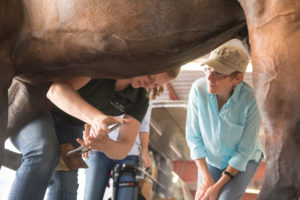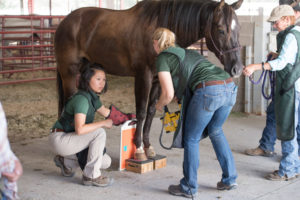On Monday morning in the barns at Cheyenne Frontier Days, Elizabeth and Sam Ellis noticed that their 9-year-old mare, Wapinitia, could barely walk. Sam soon learned that a team from Colorado State University’s Equine Clinical Services was onsite providing care, and they brought the horse to them to see what was wrong.
Wapinitia was scheduled to take part in a barrel racing competition later in the week in Rock Springs, Wyoming. Elizabeth said that she gave the CSU veterinarians a rundown of the animal’s health over the last five weeks. “I thought maybe she’d cast herself in the stall,” she said, describing what happens when a horse gets stuck in a strange position in a space.

CSU’s Dr. Katie Ellis said Wapinitia was very lame — grade 4 out of 5 — which made walking painful. The team used hoof testers, basically giant steel pinchers, to test sensitivity over the foot. They then took radiographs, to make sure that Wapinitia hadn’t fractured her foot.
“We found that she did have an abscess on that right front foot, right over where she was sensitive,” said Ellis, who is not related to the horse’s owners.
The Equine Clinical Services team — including Dr. Katie Seabaugh and Sydney Hsieh, CSU veterinary student — opened up the abscess so that it could drain. They then soaked the hoof and placed a poultice to draw the infected material out of the horse’s foot.
“Once the infection resolves, I expect her to be completely sound and to go back to her job, hopefully, within a week or so,” said Ellis.
Event attracts cowboys, cowgirls from across the country
During this year’s Cheyenne Frontier Days, which is billed as the “Daddy of ’em All” for rodeos, the CSU team has provided care for at least 10 horses each day. The new partnership offers veterinary expertise for contestants and horses competing in preliminary rodeo (slack) competition, and main event performances sanctioned by the Professional Rodeo Cowboys Association. CSU equine veterinarians and students augment the work of Dr. Heather Schneider, arena veterinarian, and other clinicians who provide regular veterinary care at Cheyenne Frontier Days.
Seabaugh, who previously provided veterinary care at Little Britches Rodeo in Pueblo, Colorado, said the new partnership is going “really well. It’s been busier than we expected.”
The CSU team has been onsite 24/7, but hasn’t yet had any overnight emergency medical situations. “We are basically trying to make the horses feel better and perform at their best, rather than address anything that’s really been a crisis or limiting,” said Seabaugh.
Chiropractic care and acupuncture has been a popular request, the CSU clinicians said.
Experience helps veterinary medicine students ‘blossom’
The new partnership provides unique teaching opportunities for residents and students. Seabaugh said the experience can really help students blossom.

Hsieh, a second-year veterinary student at CSU who has experience working with an equine veterinarian outside of her studies, said she was looking forward to seeing the different pace of medical care at one of the country’s biggest rodeos.
“It’s great to be able to see all the different facets of equine medicine,” she said. “Usually when I go to work, we see horses that are backyard ponies or show horses, but the ones at Cheyenne Frontier Days are strictly performance horses, for the most part. The diversity of the equine field is represented here and it’s great to be a part of that.”
Seabaugh said the team treated a parade horse as well as a mule who had been part of a shuttle system at the event. Some owners travel to events like this with their own veterinarians, and the CSU partnership has helped to lighten their load in Cheyenne, she added.
CSU’s Ellis said her first day at the event was going very well. “I’m happy that we had something that was fairly easy to diagnose, and it should be a quick fix for Wapinitia,” she said.
Wapinitia’s owners were equally pleased with the outcome. “They did an awesome job,” said Elizabeth Ellis, when asked about CSU Equine Services’ care. “They’re awesome. They were so thorough and so friendly, just a great group of people.”
Read more about CSU’s new partnership with Cheyenne Frontier Days.
About CSU Equine Clinical Services
Colorado State University’s equine services include primary and tertiary (highly specialized) emergency care, internal medicine, primary general health care, reproductive medicine, and sports medicine. CSU clinicians provide these services at the James L. Voss Veterinary Teaching Hospital in Fort Collins and in the Rocky Mountain region through the Field and Sports Medicine Services. The Equine Field Service team provides primary and 24-hour emergency care for equine patients in Northern Colorado. CSU’s Equine Sports Medicine service offers support for equine athletes, using the latest therapeutic, diagnostic, and rehabilitation techniques.
In addition, CSU’s Equine Reproduction Laboratory has developed and currently uses advanced techniques to optimize breeding, conception and foaling in the horse. The Orthopaedic Research Center at CSU is known worldwide for investigation of the prevention, diagnosis and treatment of musculoskeletal problems in horses. This work has expanded into translational research into the human field.